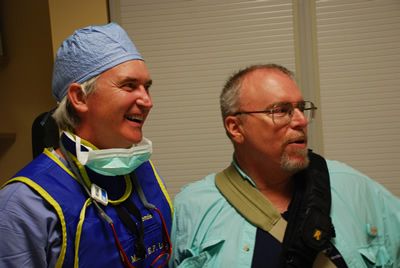Shocked By Specialized Cardiac Care
Garry Frankel, a 55 year-old photographer from Winnipeg, Canada, was visiting Minnesota for an international youth soccer tournament when on July 19, 2009, he suffered a sudden cardiac arrest in his motel room. His wife woke up at 1 a.m. to a gurgling sound coming from Garry. He had stopped breathing and was unresponsive.
Mrs. Frankel called for help, and two security guards who had taken CPR classes just two weeks earlier started chest compressions. An ambulance arrived at the scene three minutes later to shock Garry out of the fatal heart rhythm, and he was admitted to the intensive care unit at Unity Hospital. While at Unity, he underwent therapeutic cooling (also known as hypothermia) to prevent permanent brain damage from the arrest.
After completing his cooling protocol, Garry woke up and he was transferred to Mercy Hospital, where he received two stents to a coronary artery that had severe blockages. Despite opening up these blockages, however, he continued to have life-threatening heart rhythms (called ventricular tachycardia) that required numerous shocks to break. Heart rhythm specialists from Metropolitan Heart and Vascular Institute (MHVI) then inserted an implantable defibrillator in his chest and paced his heart at 130 beats per minute for the next two days to keep the life-threatening rhythms from coming back. Ultimately, Garry was stabilized and transferred to his home hospital in Winnipeg 13 days after he was first hospitalized.
Garry made an amazing recovery. He and his wife returned to Minnesota one year later to personally thank the cardiologists at MHVI who performed the interventional heart procedures that saved his life. They expressed personal gratitude to Dr. Stephen Remole, a heart rhythm specialist, who took care of him from day one until he was on the plane back to Winnipeg. According to Garry, the care he received from MHVI cardiologists while at Unity and Mercy was “very much more aggressive in every respect [than] that is typical at home…[The doctors and nurses] never gave up until I recovered, even though I wasn’t doing well…and I lived.”
Cardiologists at MHVI have built an exceptional program with other specialists from emergency services and intensive care to treat patients with out-of-hospital cardiac arrest. The average survival rate for patients admitted to Mercy Hospital with cardiac arrest is 50%, compared with the national average of 13%. For information on sudden cardiac arrest, please refer to the educational site at the American College of Cardiology.



Leave a Reply
Want to join the discussion?Feel free to contribute!